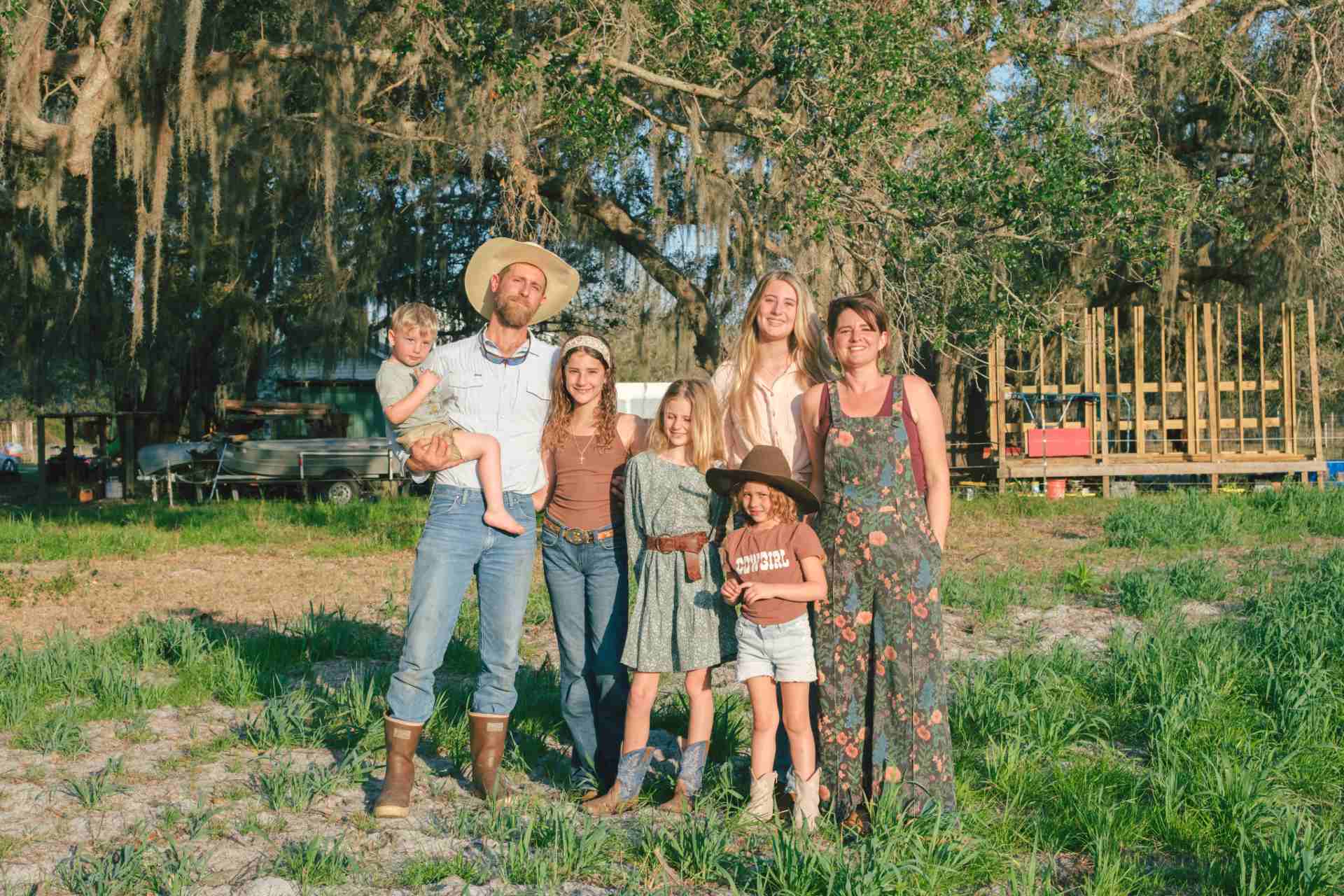
Tim and Chelsea Clarkson and their five children at the family farm they operate in DeSoto County, Grove Ladder Farm. | Photo by Manny Rangel for Suncoast Searchlight
DeSoto County farm defies avian flu surge, keeps eggs affordable as prices climb
Grove Ladder Farm sits at the end of a dirt road deep in DeSoto County.
Owned and operated by Tim and Chelsea Clarkson, the farm’s 13 acres spread out in green pastures shaded by giant oaks draped with Spanish moss. A scarecrow named Gertrude watches over a vegetable garden with bouquets of broccoli ready to pick, while two Great Pyrenees dutifully guard grazing sheep and ewes.
The farm also boasts a flock of roughly a thousand chickens that happily roam the grounds. When Tim reached down to grab one on a recent afternoon, the chicken froze and stuck up its tail. Chelsea smiled and said it meant the hen was ready to mate.
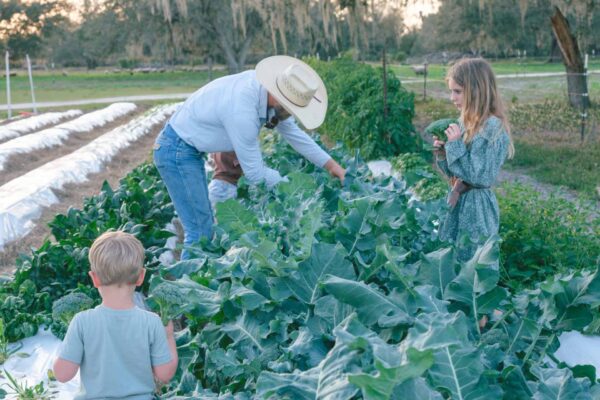
In addition to its many chickens, Grove Ladder Farm boasts sheep, ewes and a lush vegetable garden with bouquets of broccoli ready to pick. | Photo by Manny Rangel for Suncoast Searchlight
The Clarksons established Grove Ladder Farm in 2010, soon after they married. Chelsea had just finished college, and the couple, who grew up in Sarasota and have known each other since middle school, wanted a simple farm life that prioritized good, whole food and responsible stewardship of the land.
That they’ve managed to run a profitable venture while raising their five children in a small cabin fills them with pride. It also offers a valuable lesson: The Clarksons’ sustainable, ethical land and husbandry practices have allowed them to weather the avian flu crisis that has shaken the factory farm egg industry nationwide.
Grove Ladder eggs are the couple’s main venture, and their chickens produce about 650 of them a day. The Clarksons have managed to keep their flock healthy and their egg prices steady at $7.25 a dozen.
Tim credits this feat to the practice of pasture-based farming, which means that all their animals are outside in the sun, feeding on fresh grass 24 hours a day, 365 days a year.
Contrast this with the kind of large poultry operations that produce the majority of commercially available eggs. These factory farms typically warehouse as many as a half-million chickens, confined for the entirety of their lives in small cages and fed genetically modified grain, Tim told Suncoast Searchlight.
Even eggs labeled “cage-free” can mislead consumers. Cage-free just means the birds are allowed to roam inside a huge warehouse, again eating genetically modified grain, without ever seeing the sun or pecking dirt.
When an egg carton label at the grocery store says “caged-free organic” – something that sounds healthier and more ethical – the grain is organic and the barned chickens have access to the outdoors, but it’s often just a fenced-in concrete pad or, at best, a dusty yard.
All of these scenarios provide the perfect environment for viruses like avian influenza (H5N1 virus) to spread.
And spread it has.
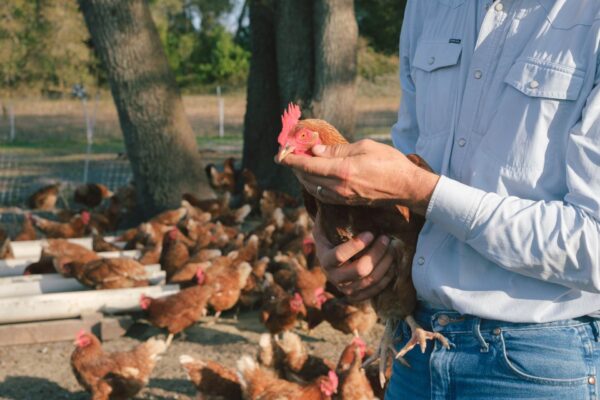
Grove Ladder Farm boasts about a thousand chickens that happily roam the grounds, scratching at the earth and feeding on insects and fresh grass. Together, they lay roughly 650 eggs a day. | Photo by Manny Rangel for Suncoast Searchlight
Avian flu decimates poultry population
Since 2022, the virus, which is transmitted naturally by wild waterfowl, has infected or killed more than 160 million poultry. A new version of H5N1 emerged last fall and has since spilled over to dairy cows and humans. Just this month, one case was confirmed in a sheep in England.
In the last three months alone, more than 10% of the nation’s egg-laying population has been killed to prevent the spread of the disease. This has caused the average wholesale price for large, white-shell eggs to reach a record-breaking $8.17 a dozen in early March, according to data from the U.S. Department of Agriculture.
The previous all-time high was in December 2022, when the price reached $5.46 per dozen. The USDA does not have a working vaccine against the current strain of avian flu, so American consumers should expect egg prices to continue to increase.
Even backyard flocks have been affected by the virus, according to the USDA, whose virus detection dashboard confirmed outbreaks among these smaller farms in all 50 states, including Florida. But Tim said the chances of an outbreak diminishes with chickens, like his, that are exposed to direct sunlight.
“Sunlight kills avian influenza,” he said.
This is corroborated by a 2013 study that found the H5N1 was inactivated within half an hour at (98.6 to 107 degrees Fahrenheit) in the presence of sunlight and up to four days in the shade at (77 to 89.6 degrees Fahrenheit).”
The Clarksons use the Joel Salatin method of raising poultry. Salatin, a Virginia farmer who gained fame after being featured in Michael Pollan’s 2006 book, “The Omnivore’s Dilemma,” promoted a regenerative farming method that has since become the standard among small-scale agriculturalists.
The method advocates for a rotational grazing technique with movable electric fencing that mimics the natural pattern of wild herds.
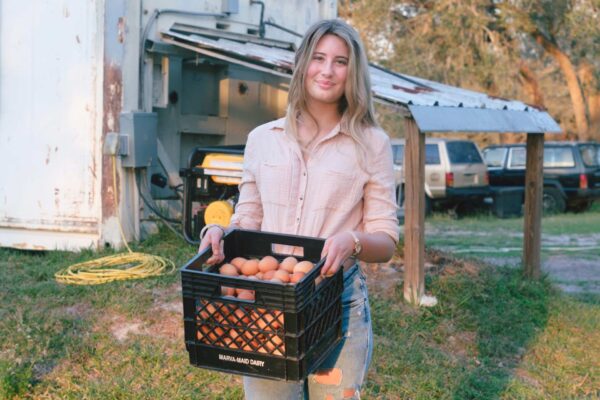
Celeste, the oldest of the Clarksons’ five children, carries the day’s haul of eggs in a crate. | Photo by Manny Rangel for Suncoast Searchlight
At Grove Ladder, the sheep graze on tall grass in one area before being moved to a new pasture. Once they leave, the chickens are brought in to forage on the freshly trimmed, tender green grass they prefer. The chickens spread their nutrient-rich manure, which fertilizes the soil and helps the grass regrow in just a few weeks. Then the larger grazing animals move there and mow that pasture.
Meanwhile, the chickens take dust baths, eat a diet of protein-rich bugs, fresh produce and non-GMO grain.
A recent visit to the farm revealed chickens that freely scratched at the earth with the sunlight on their backs. They looked happy.
As did the Clarksons.
From humble homestead to thriving farm
When they started, the couple were living on the farm in a makeshift setup – staying illegally in a trailer, relying on an outhouse. In those early days, they were focused on building both their family and their farm from the ground up. Chelsea, a self-described “recovering hippie,” recalled the time one of her daughters, having grown up using only an outhouse, once attended a party and mistook its cornhole game for a bathroom.
Now, their once-humble homestead has grown into a thriving operation with both Tim and Chelsea handling their respective duties. While Tim tends the farm, Chelsea manages the administrative side of the business and also homeschools the couple’s five children.
Of course, there were struggles along the way and times the couple said they wondered if they’d made a mistake. Chelsea recalled Tim coming home after a day of slaughtering and processing chickens.
“He would come in covered in chicken blood, looking like a zombie,” she said. “I asked myself, ‘Is this chicken farm thing gonna work?’”
Today, the answer is yes. But while eggs are still the couple’s main venture, they are no longer the most profitable part of their business.
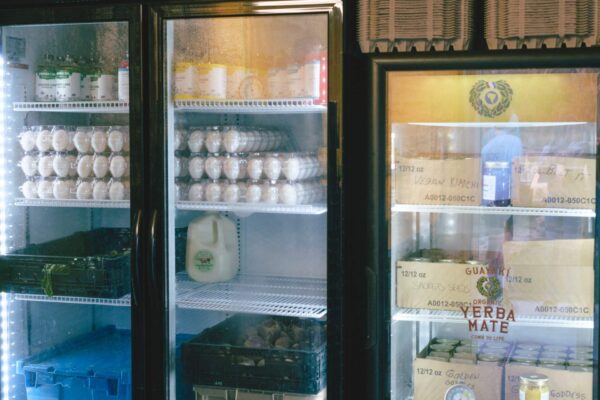
Grove Ladder Farm sells eggs, grass-fed beef, lamb and Chelsea’s handspun yarn – but they also sell other local farmers’ artisanal products, like sauerkraut, kimchi, honey, organic vegetables, mushrooms and bread. | Photo by Manny Rangel for Suncoast
In 2020, when the COVID-19 pandemic shuttered farmers’ markets across the state – the bread and butter of the Clarksons’ sales – they launched a website to sell their own products: eggs, grass-fed beef and lamb and Chelsea’s hand-spun yarn. They also began to sell other local farmers’ artisanal products, like sauerkraut, kimchi, honey, organic vegetables, mushrooms and bread. All products must meet the Clarksons’ ethical, sustainable standards.
“It really took off in 2021 and hasn’t slowed down since,” Tim said “I think people’s eyes being open to the supply chain vulnerabilities had everybody looking for local food.”.
He estimates that, today, they feed up to 1,000 people a week through Grove Ladder and its partnerships.
“Our business has morphed into a cooperative where we are supporting and buying from other local farms,” Tim says. “I actually don’t make much profit from our eggs – they are a loss leader. I keep our egg prices competitive to keep our customers coming for that, and we make money on the other products that we sell.”
These relationships have become one of the most rewarding parts of the couple’s farming now.
“We’ve become really close with all the farmers that are raising the animals and growing the vegetables,” Tim said. “And that’s been one of the coolest things for me is getting to know all these people and building relationships with the farmers that are right around us.”
Clarksons part of growing conservation movement
Other local agricultural folks are taking notice of the Clarksons. Manatee County rancher Jim Strickland, a former president of the Florida Cattlemen’s Association, has a family history of Florida ranching that dates back to the 1800s. He says the community needs more families like the Clarksons.
“I believe in feeding people with local food,” he said.
Small Florida farms are disappearing. Forty-acre orange groves or a ranch with 50 head of cattle used to be able to support a whole family. Many of these places are gone now.
“What the Clarksons are doing,” Strickland said, “is reinvigorating and sustaining that local supply of food.”
Grove Ladder does more than provide food, though. For Strickland, the Clarksons are helping maintain Florida’s green spaces – something he is trying to do, as well.
“With all our acres, we produce more than just what comes out of the front gate as beef,” he said. “Through the preservation of ranch land, you are getting aquifer recharge, you are getting wildlife corridors, you are getting endangered species habitat, panther habitat.”
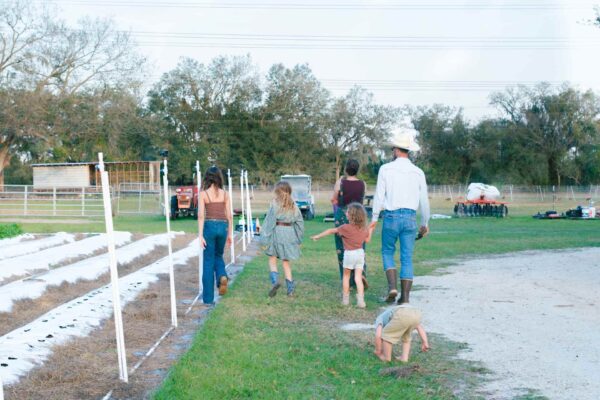
The Clarkson family operates Grove Ladder Farm outside Arcadia. While Tim tends the farm, Chelsea manages the administrative side of the business and also homeschools the couple’s five children. | Photo by Manny Rangel for Suncoast Searchlight
The Clarksons are committed to this preservation. This way of life can work, they said
Just a few years ago, they moved their family out of the intimately cramped cabin and into a newly constructed building right next door that they fondly call the “barndominium.”
Daily life revolves around land and animals. The sheep and lambs come up for a nuzzle when the family walks through the pastures, and the cows look up lazily from grazing. The dogs are ever-present companions. Their children roam freely, and Tim and Chelsea don’t fret over them. It’s their land and they know it well.
Chelsea said that the etymology of the word “husband” refers to the tiller of the soil. Tim doesn’t have to commute to an office five days a week. Instead, he’s out on their land. In between homeschooling the kids, she’ll bring him lunch.
There are parts of urban city life that she said she misses – there isn’t maternity care out in the country, and the orthodontist only comes to town every week or so – but she said she wouldn’t wish for another way of life.
“Not a lot of people get to live out their purpose,” she said.
Added Tim: “I’m really lucky to be able to live this life.”
Isaac Eger is a freelance writer for Suncoast Searchlight, a nonprofit newsroom of the Community News Collaborative serving Sarasota, Manatee, and DeSoto counties. Learn more at suncoastsearchlight.org.


